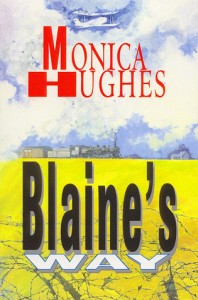 Summary: Asked to recount the experiences of his childhood on tape for the sake of prosperity and his new grandson, Blaine begins his story from when his parents lost their farm. Progressing onward from when he was six years old, he tells of moving in with his grandparents and his mother leaving the farm, hoping to pursue her dreams in Toronto. Blaine has his own dreams of getting out into the world, and when World War II comes along he doctors his birth certificate and signs up expecting adventure. What he does get is more than he bargained for, and a new appreciation for life on the farm.
Summary: Asked to recount the experiences of his childhood on tape for the sake of prosperity and his new grandson, Blaine begins his story from when his parents lost their farm. Progressing onward from when he was six years old, he tells of moving in with his grandparents and his mother leaving the farm, hoping to pursue her dreams in Toronto. Blaine has his own dreams of getting out into the world, and when World War II comes along he doctors his birth certificate and signs up expecting adventure. What he does get is more than he bargained for, and a new appreciation for life on the farm.
Number of Pages: 224
Age Range: 13-14
Review: Somewhere along the way, I forgot the whole story was actually a grandfather talking to tapes for his grandson and namesake. I was so wrapped up in the tale of his childhood that coming back to the present, years later, was a bit of a jolt.
It’s a classic story of life on the farm in Ontario during the Depression, and how World War II was an opportunity turned ugly for a lot of young men. I know Blaine had a wanderlust just like his mother, but I couldn’t help but wonder what would have happened if the war hadn’t come along. Would Blaine have ever left the farm? Was it really necessary to have him venture out into the world only to be struck down and maimed? Realistic, perhaps, because he was a soldier who participated in the Battle of Dieppe, but terribly, terribly sad. Returning home after you go out into the world because you realise it is where you want to be is one thing, but returning home injured and out of necessity is another. Was Blaine simply making the best of a bad situation? I don’t know for sure.
But I did like the theme of passing on stories and memories to the next generation. I was also fascinated by Monica Hughes’ exploration of life during the Depression, and the stark contrast the start of World War II brought to reinvigorate the economy.
I’d recommend it for early teen readers, probably in a history class setting.
Memorable Quotes:
“A car came by and stopped to pick him up. I stood at the bottom of the lane staring along the dusty road. He didn’t want my love. He didn’t want anyone’s love.
I struggled with this idea. Slowly, I began to understand that after Mom had hurt him, not just the once when she left, but over and over again up till that last moment, he wasn’t going to let himself be hurt by anyone ever again. Even if he had to shut out the whole world shut out the pain.
‘That’s crazy,’ I thought angrily. ‘You can’t do that. You might as well be dead.'” – Blaine observing his father from Blaine’s Way by Monica Hughes, page 138
“The time we shared that summer, talking about books, escaping into the world of Cavaliers and Roundheads, of D’Artagnan and the Cardinal, was like the still point at the centre of a hurricane. Outside, things were beginning to change. On the surface, there was just the haying and the wheat and oats and tobacco. But beyond our everyday life, it was as if a great clock was ticking.” – Blaine talking about the last summer before WWII began from Blaine’s Way by Monica Hughes, page 159
Blaine’s Way by Monica Hughes is published by Fitzhenry & Whiteside, (2006).




 Amy Mathers has been passionate about reading from a very young age, and hopes others will share her enthusiasm for funding a teen book award.
Amy Mathers has been passionate about reading from a very young age, and hopes others will share her enthusiasm for funding a teen book award. 





